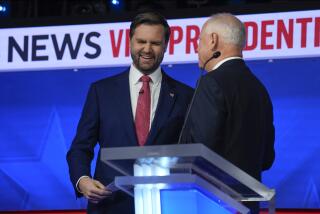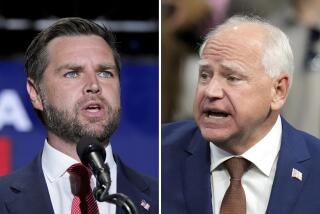Some Candidates Relish Forums, Others Are Weary of Them : Debates Get Mixed Reactions From Democrats
- Share via
DES MOINES — Illinois Sen. Paul Simon is tired of them. Sen. Albert Gore Jr. of Tennessee relishes them. Massachusetts Gov. Michael S. Dukakis grumbles about them. And former Arizona Gov. Bruce Babbitt can’t wait for the next one.
The so-called “Year of the Debate” is fast becoming the “Year of the Debate Over the Debate,” as Democratic presidential candidates weigh their benefits and party leaders strive to put a lid on their number.
The first presidential contest is still three months away, and there already have been 13 debates and at least another dozen so-called forums featuring at least some of the candidates.
Hailed as Positive Shift
Three months ago, the packed schedule of upcoming debates was hailed as a positive shift away from expensive and often meaningless straw polls as a key test for candidate strength. Since no clear front-runner had emerged, candidates could not afford to pass up a debate.
But now some political analysts see the proliferation of debates as too much of a good thing, boring the electorate and reinforcing the image of dwarfs who sound alike and think alike.
“It’s ridiculous,” said Simon after a recent debate. “When Jesse Jackson says we’re all getting bored, he’s right.”
The preferences of the candidates reflect the usefulness of the debates to their individual campaigns. Gore is widely believed to have used the forums most effectively, delivering a mainstream message that has helped build his support in the South. Babbitt, whose campaign works with organizers to increase the number of debates, is still a dark horse who needs the exposure.
Simon and Dukakis are running ahead in Iowa polls, and campaign rallies and fund-raisers may now be more valuable to them than debates that allow their fellow contenders to poke holes in their platforms and put them on the defensive.
Aired on Cable TV
Although many of the debates have been broadcast nationally on C-SPAN, a public service cable channel, analysts say only activists and political junkies routinely watch them. More of the debates will soon be aired on network television, and the potentially larger audiences are expected to bring more verve and tension to the matches and diminish the complaints.
“Just as everyone is beginning to say, ‘Oh my God, I can’t take another one,’ we’re moving into a real new phase,” said one campaign aide.
The debates have evolved from friendly, polite forums in which the candidates tried to communicate their messages to testy, sniping exchanges that reveal their different strategies.
Gore has used the debates to portray himself as the only electable, mainstream Democrat--a tactic that has been successful even though Gore is only slightly more conservative than the rest.
Before he crept to the top of Iowa polls, Simon appeared to benefit from the debates because he had “that wonderful advantage of looking like his strategy,” said Democratic political consultant Robert Squier, who is not working for any of the contenders this season. Simon’s bow tie, horn-rimmed glasses and big ears project a down-home, unpackaged man who doesn’t try to alter himself for anyone.
Debates Lose Attraction
Simon still looks as frumpy as ever, but now he is considered the Iowa front-runner. It is an ephemeral status in this election season in which most voters are undecided, but one that nevertheless makes debates less attractive for him.
For example, Simon scored first in a poll of members of an Iowa teachers’ organization last month. But during a recent debate on education, his opponents attacked him for having favored a constitutional amendment to balance the budget. A representative of the teachers’ group said many members had been unaware of Simon’s stand and, afterward, expressed discomfort about it.
For Simon, the debates have also complicated an intense schedule of campaign stops and fund-raising events. At one recent forum, Simon was so groggy from lack of sleep that his performance noticeably suffered.
Dukakis’ prior experience as a television show host lends him a chatty, comfortable presence on television, a stylistic plus in the early debates. But political analysts say he has stumbled in recent performances, possibly because his message has become fuzzier.
In the early debates, he portrayed himself as a hands-on administrator whose approach to governing was strikingly efficient compared to what many people think is the sloppy managerial style of Ronald Reagan.
Forced to Drop Tactic
But Dukakis dropped much of that tactic after being forced to admit in late September that his campaign manager, unbeknown to him, had distributed a videotape that helped push Sen. Joseph R. Biden Jr. (D-Del.) out of the race.
Babbitt, on the other hand, thrives on the debate exposure, which his poorly financed campaign could not afford to buy. Analysts frequently rate him “the most improved.”
In the first debate in Houston in July, Babbitt repeatedly bobbed his head up and down, an irritating habit that left a poor impression with many viewers.
Since then, staffers routinely bring a portable TV camera along on the campaign trail and tape him as he practices opening and closing debate statements. He reviews the tapes frequently and meets with a professional media coach every two weeks.
Mike McCurry, a Babbitt aide, said the campaign is on the lookout for more debates to participate in so the better rehearsed Babbitt can project the “smart, but also, approachable” demeanor he is cultivating. “We’re banking on the debates for a large part of our strategy going into the next year,” McCurry said.
Polished Performer
Missouri Rep. Richard A. Gephardt, another debate defender, is also a good performer. Even other campaigns concede that Gephardt is polished and prepared on stage. “He walks in and follows a program to a ‘T’ . . . ,” acknowledged McCurry. “I think he’s been pretty effective.”
Gephardt has used recent debates to try to pull himself out of a widely perceived slump in Iowa, where his progress in the polls has stalled. He has been more openly critical of his opponents as he has tried to project a more aggressive image.
The Rev. Jesse Jackson gets mixed reviews, and his assessments of the debates are equally mixed. In an interview last month, he said he welcomed the debates as a “free commercial.” But at a recent forum on education, Jackson joked that any candidate who kept the audience awake during the exchange deserved to be President.
It may just have been an off night for Jackson.
“I know that Jackson had a headache,” said George Brown, political director of the Iowa State Education Assn., one of the groups that sponsored the debate.
One GOP Debate
Unlike the Democrats, the Republican candidates have had only one full-scale debate. They have felt less pressure to debate because they have few political ties to the liberal interest groups that host most of the events. Moreover, unlike the Democrats, Republicans have a clear front-runner in Vice President George Bush. His position in the polls has led him to decline many invitations.
Debate organizers say they have not been offended by the complaints of the Democratic contenders and defend the usefulness of the forums. Iowa Democratic Party Chairwoman Bonnie Campbell has canceled plans to try to limit the forums, saying she will “bow out” of the fray because some of the candidates want the debates as much as others want to get out of them.
Democratic National Committee Chairman Paul G. Kirk Jr. met with several campaign managers in October to try to resolve the problem. As a result, the Democratic National Committee agreed to serve as a clearinghouse for debate information. The party will keep track of which candidates plan to attend which debates. Party officials hope this will prevent debate organizers from blackmailing candidates into attending by falsely contending that all the others are going to show.
More to Read
Get the L.A. Times Politics newsletter
Deeply reported insights into legislation, politics and policy from Sacramento, Washington and beyond. In your inbox twice per week.
You may occasionally receive promotional content from the Los Angeles Times.











